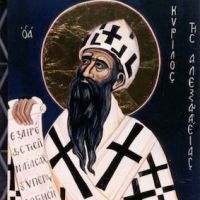- Home
- About us
- Students
- Courses
- Research
- Library
- News & Events
- Gallery
- Contact
- Our Blog
Latest News

2013 St Andrew's Patristic Symposium
→ Back to all Patristic Symposia
St Andrew's 5th Patristic Symposium
'St Cyril of Alexandria'

Convened by the Very Revd Dr Doru Costache and Dr Philip Kariatlis, St Andrew's Patristic Symposium on St Cyril of Alexandria, which was held on the 20-21 September, 2013 at the Theological College, was a huge success. Opened by His Grace Bishop Iakovos of Miletoupolis with prayer and introductory remarks Keynote speakers Professor Pauline Allen FAHA (Director of the Centre for Early Christian Studies, ACU Brisbane, QLD) and Professor David Bradshaw (Professor of Philosophy and Chair of the Philosophy Department at the University of Kentucky, Lexington KY, USA)
Select proceedings from this Symposium are scheduled to be published as peer reviewed journal articles in St Andrew's Theological Review, Phronema 29:2 (2014). This issue of Phronema will be edited by the Symposium's convenors.
Convened by:
The Very Revd Dr Doru Costache and Dr Philip Kariatlis
We welcome presentations from the different disciplines of Christian theology interested in further reflecting on this central doctrine of the Church, irrespective of their field of expertise, academic affiliations or denominational background. Indeed, it is hoped that this cross-disciplinary approach (whether this be systematic theology, patristics, ethics, biblical studies, church history, liturgics, etc) will contribute by casting further light - indeed a more enriching and holistic perspective - to this most significant Christian teaching.
Keynote Speakers
Professor Pauline Allen
Keynote Address:
"St Cyril of Alexandria: Exegete, Politician, or Pastor?"
Abstract: ‘Cyril’s role as an episcopal administrator, positively considered, can be seen to be a very neglected area of studies’ (John A. McGuckin, ‘Cyril of Alexandria. Bishop and Pastor’, in Thomas G. Weinandy and Daniel A. Keating, The Theology of St Cyril of Alexandria. A Critical Appreciation [London and New York: T&T Clark 2003] 205-236). Thus the questions to be asked are whether Cyril was not interested primarily in pastoral aspects of his episcopal role, whether the evidence of his pastoral involvement is simply too difficult to discern or assemble from his numerous exegetical and polemical works, or whether finally his role as a pastor has been neglected by scholars—in favour, for example, of his political activities. On the basis of a recent study which draws on modern theories of pastoral care to outline the profile of the pastoral activities of a late-antique bishop, I propose to assess Cyril as pastor. The salient aspects of this profile are the following: (i) the administration of justice and social welfare; (ii) teaching and preaching; (iii) conversion; (iv) the maintenance of orthodoxy; (v) the ransom of captives; (vi) the provision of spiritual direction or guidance; (vii) ritualised care in the form of liturgical rites; and (viii) a charismatic ministry of prayer. How does St Cyril measure up?
Professor David Bradshaw
Keynote Address:
"The Philosophical Theology of St Cyril's Against Julian"
Abstract: Although it is primarily a work of apologetics, Cyril's Against Julian also includes a great deal of philosophical interest. It includes, for example, discussion of questions such as: Can God deliberate, given that He is unchanging and has perfect foreknowledge? Can He change His mind? Why does He act in ways that He knows will permit creatures to do evil? Does He experience emotions such as anger and jealousy, and, if so, how is this compatible with divine goodness? In this paper I examine Cyril's answer to such questions. Drawing on the approach of John McGuckin, I argue that his answers implicitly lead to a parallel between the divine economy displayed in the Incarnation and that displayed as God acts within time and history more generally.
→ Back to all Patristic Symposia

.jpg)





.png)